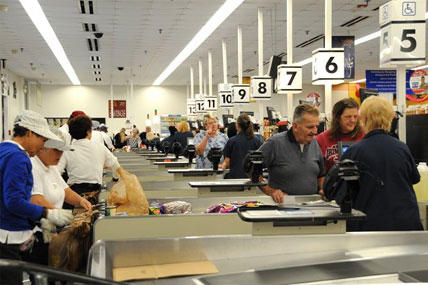Some stateside commissaries are unable to process food stamps, and some WIC and debit card payments after the security certificate in store PIN pad terminals expired Dec. 7, shutting down the system.
The problem, which was not a data security breach and did not put any patron payment information at risk, impacted Defense Commissary Agency stores as well as some civilian grocers across the U.S., officials said.
"On December 7 thousands of older model PIN pads produced by Hypercom were unable to process debit card, EBT and electronic WIC transactions because the terminals' cryptographic certificate expired," Kevin Robinson, a DeCA spokesman, said in a statement. "As of Dec. 14, approximately 60 percent of DeCA's total PIN pads are able to process all of our customer's electronic transactions requiring a PIN."
The problem has the biggest impact on commissary shoppers who want to use electronic benefits transfer (EBT) food stamp benefits.
Stores where terminals are down can still run debit cards as credit cards, but are unable to give cash back. They can also process Special Supplemental Nutrition Program for Women, Infants, and Children (WIC) transactions on paper. However, patrons who want to use food stamp benefits will need to do so at a different store or wait until the system is repaired.
Commissary shoppers used $130.6 million in food stamps, officially known as the Supplement Nutrition Assistance Program (SNAP), in fiscal 2013, the most recent year for which data is available, according to the Defense Department. About $29 million in WIC benefits were redeemed that same year.
Commissary officials said they expect the systems to be completely operational by Christmas.
The payment terminals, manufactured by Hypercom, contained security certificates from 2004 that were good for 10 years. But that company has since been absorbed by another, Equinox Payments, and the certificate's expiration was "unforeseen," Equinox Payments officials said.
"While we did not produce these terminals, we have an ongoing business relationship with many of these customers and have provided repair and maintenance services for certain of these models in the past, and therefore have the capability to repair them," Stuart Taylor, vice president of payment solutions for Equinox said in a statement.
Officials with Mazon, an anti-hunger organization, said service member's best option at rural bases where no other grocery stores are easily accessible is heading to a local food bank.
The terminal problem highlights the need for the Defense Department to reform its Family Subsistence Supplemental Allowance (FSSA) benefit, which is designed to replace food stamps for military families, officials said.
Unlike SNAP, which requires users spend the benefit on a limited list of items, FSSA is given to troops as a paycheck plus-up. Officials with Mazon said the Defense Department can make the program more user friendly by making enrollment automatic for qualifying families and raising the maximum income allowed to qualify.
"If that program were functioning better, families that are eligible wouldn't have to worry about the SNAP terminals going down," said Michelle Stuffmann, a spokesman for Mazon.
Only 285 military families used the FSSA program in 2013, military officials said.
-- Amy Bushatz can be reached at amy.bushatz@monster.com






























